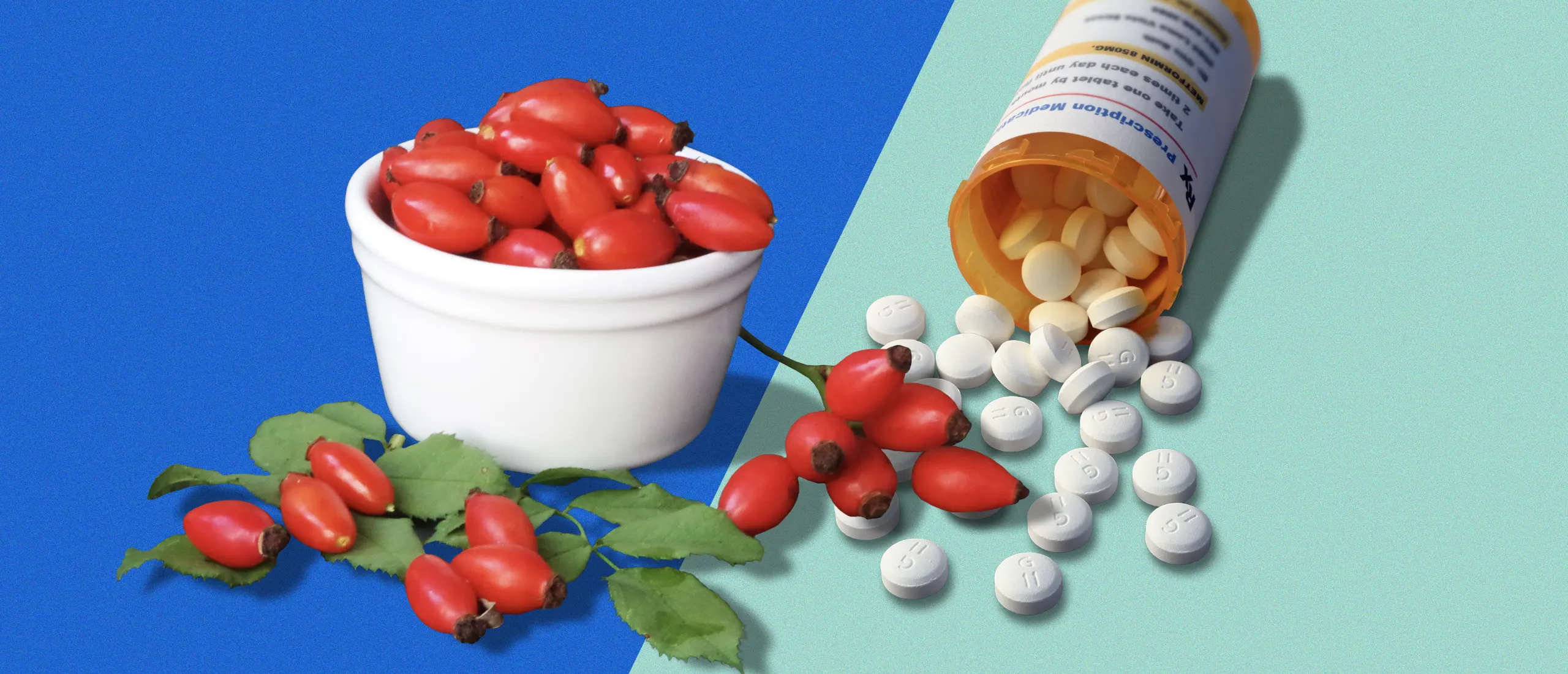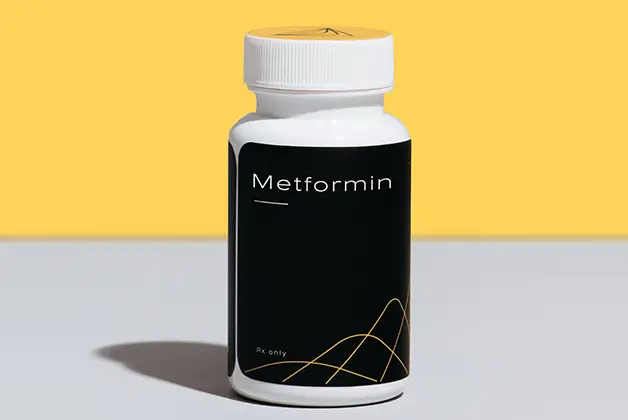Metformin vs Berberine—Which One Is Better for Diabetes Treatment?
- By Jennifer Chesak
- Fact-checked by Aviv Joshua
- January 26, 2024
Metformin and berberine are two powerful blood sugar-lowering compounds, which is important given that managing blood glucose (sugar) levels is crucial for preventing prediabetes and managing type 2 diabetes (1). Keeping glucose levels in check is also key for weight management and overall chronic disease prevention (2). When it comes to which intervention—metformin vs. berberine—to choose for managing both blood glucose and weight, you’ll want to consider a few key pieces of information.
Ahead, health professionals compare the similarities, differences, potential benefits, and possible side effects of metformin and berberine.
Metformin vs. Berberine: What Are the Main Differences?
The biggest difference between the two pills? Metformin is a prescription medication, while berberine is an herbal supplement you can buy over the counter.
“Berberine is a natural alternative, while metformin has more extensive, long-term safety data available and widespread availability,” says Menka Gupta, M.D., FMCP. “Metformin is often favored as the initial choice by healthcare professionals.”
What is metformin?
Metformin received U.S. Food and Drug Administration (FDA) approval in the mid-90s for lowering blood sugar levels in people with type 2 diabetes, though it has some off-label uses—right now it’s being studied for longevity (3). Its use in the U.S. is on the rise, with the number of prescriptions nearly doubling from about 41 million in 2004 to more than 91 million in 2021 (4).
Type 2 diabetes is characterized by high blood sugar levels and insulin resistance, both of which are also linked to obesity and weight gain (2). Metformin lowers blood sugar levels and helps increase insulin sensitivity (5).
“Metformin works by primarily reducing the liver’s ability to release glucose from its stores,” Menka says. “Metformin has also been shown to inhibit the absorption of glucose from the intestines.”
About the Experts
Menka Gupta, M.D., FMCP, a functional medicine doctor with over 20 years of experience, and founder of NutraNourish. She has experience treating people with anxiety, depression, insomnia, digestive disorders, chronic fatigue, thyroid issues, and diabetes.
Lauren Thayer, R.N., a registered nurse at Health Canal. She specializes in pediatrics, rehabilitation, and as of late, clinical informatics.
What is berberine?
Berberine is an herbal supplement you can buy over the counter, including online. It’s a compound derived from various plants, such as barberry, goldenseal, goldthread, Oregon grape, phellodendron, and tree turmeric (6).
“Berberine activates the AMP-activated protein kinase (AMPK),” Lauren Thayer, R.N. says. AMPK helps to regulate metabolism and blood sugar levels in the body. “This activation process is believed to be what helps treat diabetes,” she says, explaining a few biomarkers—including Hemoglobin A1c and cholesterol levels—may improve after taking berberine.
If you’re taking metformin, don’t take berberine without first consulting your doctor. Using a combination of the two could cause hypoglycemia, where blood sugar drops too low.
Which one is most effective for treating type 2 diabetes?
In various studies, berberine has been shown to have similar effects as metformin in people with type 2 diabetes (7, 8).
Both compounds have been shown to do the following:
- Lower fasting glucose: blood sugar levels after fasting (8, 9)
- Lower postprandial glucose: blood sugar levels after eating (8, 9)
- Lower hemoglobin A1c: a measure of average glucose levels over about three months (8, 10)
- Lower fasting triglycerides: lipids (fats) in the blood after fasting (11, 9)
- Lower low-density lipoprotein (LDL): “bad” cholesterol (11, 12)
- Raise high-density lipoprotein (HDL): “good” cholesterol (11, 13)
- Lower body mass index (14, 15).
Improving all of these biomarkers is beneficial for longevity, metabolic health, weight loss, and more (16).
“Berberine helps reduce inflammation,” Menka says. “Its anti-inflammatory properties help treat diabetes and other inflammation-related health conditions. Research also suggests that berberine could help lower LDL cholesterol and triglyceride levels. It does so by affecting lipid metabolism.”
Metformin has a long-standing history of helping with these same biomarkers. Plus, both metformin and berberine may help prevent cancer, but more research is needed (17, 18).
However, berberine does have one interesting advantage, Menka notes. “Berberine has an antibacterial action that seems to remove the harmful bacteria in the gut and enhance the growth of healthy bacteria (19). This improvement in gut microbiome balance leads to improved gut health.”
Ultimately, research on berberine is still in the relatively early stages, whereas more research is available on the efficacy and safety of metformin.
“Berberine is not approved by the FDA to treat any conditions and is considered a dietary supplement,” Thayer explains. “Metformin is FDA approved and is regulated and tested for safety and effectiveness. While Berberine is generally considered safe for adults, it has not undergone the same rigorous testing that metformin has.”
What Are Some Side Effects of Taking Metformin or Berberine?
Both metformin and berberine can cause side effects, often related to the gut according to both experts.
Metformin side effects and interactions
Some common adverse effects include (20):
- abdominal pain
- diarrhea
- loss of appetite
- metallic taste
- nausea
- vomiting
Berberine side effects and interactions
After taking the herbal supplement, you may experience (21).
- abdominal pain
- constipation
- diarrhea
- gas
- stomach upset
Metformin, now available from Hone, may help you ward off age-related illnesses. Connect with a doctor and get treatment delivered—without leaving home.
The Bottom Line
Metformin is a prescription medication, while berberine is an herbal supplement you can buy over the counter. Both compounds help lower blood sugar and improve biomarkers related to longevity, metabolic health, and weight management. Metformin is approved for the treatment of type 2 diabetes, while berberine is not approved to treat any disease.
If you have prediabetes or type 2 diabetes, your doctor may prescribe metformin. However, if your doctor says you don’t need metformin, you may consider taking berberine to help manage blood sugar levels and prevent the development of metabolic health issues. As always, speak with your physician ahead of introducing any new supplement into your diet.
References
1. Centers for Disease Control & Prevention (CDC) et al (2022). Prediabetes — Your Chance to Prevent Type 2 Diabetes.
2. Yashi K, et al. (2023). Obesity and type 2 diabetes.
3. Corcoran C, et al. (2023). Metformin.
4. Statista. (2023). Number of metformin prescriptions in the U.S. from 2004 to 2021.
5. Rena Graham. (2017). The mechanisms of action of metformin.
6. National Center for Complementary or Integrative Health, et al (2023). In the news: berberine.
7. Guo Hui-Hui, et al (2023). Berberine is a potential alternative for metformin with good regulatory effect on lipids in treating metabolic diseases.
8. Xie W, et al. (2022). Glucose-lowering effect of berberine on type 2 diabetes: A systematic review and meta-analysis.
9. Foretz M, et al. (2023). Metformin: update on mechanisms of action and repurposing potential.
10. Jennifer Hirst, et al. (2012). Quantifying the effect of metformin treatment and dose on glycemic control.
11. Koppen LM, et al. (2017). Efficacy of berberine alone and in combination for the treatment of hyperlipidemia: A systematic review.
12. Hu D, et al. (2021). New insight into metformin-induced cholesterol-lowering effect crosstalk between glucose and cholesterol homeostasis via ChREBP (carbohydrate-responsive element-binding protein)-mediated PCSK9 (proprotein convertase subtilisin/kexin type 9) regulation.
13. Zhang Chao, et al (2015). Differential response in levels of high-density lipoprotein cholesterol to one-year metformin treatment in prediabetic patients by race/ethnicity.
14. Xiong P, et al. (2020). The effect of berberine supplementation on obesity indices: A dose- response meta-analysis and systematic review of randomized controlled trials.
15. Yerevanian A, et al. (2020). Metformin: mechanisms in human obesity and weight loss.
16. Li Xia, et al. Clinical biomarkers and associations with healthspan and lifespan: Evidence from observational and genetic data.
17. Saraei P, et al. (2019). The beneficial effects of metformin on cancer prevention and therapy: a comprehensive review of recent advances.
18. Rauf A, et al. (2021). Berberine as a potential anticancer agent: A comprehensive review.
19. Amy B. Locke, et al. (2017). Berberine.
20. MedlinePlus. Metformin.
21. Cleveland Clinic. What to Know About Berberine: Benefits, Uses and Side Effects.













